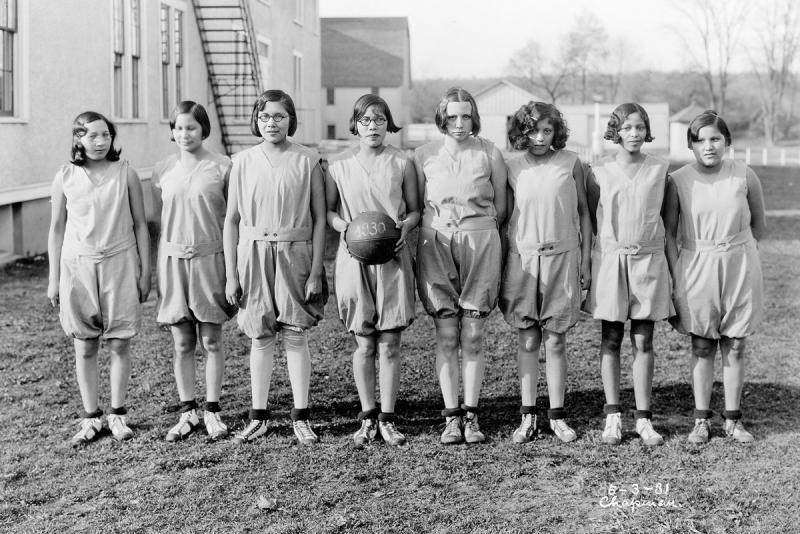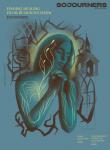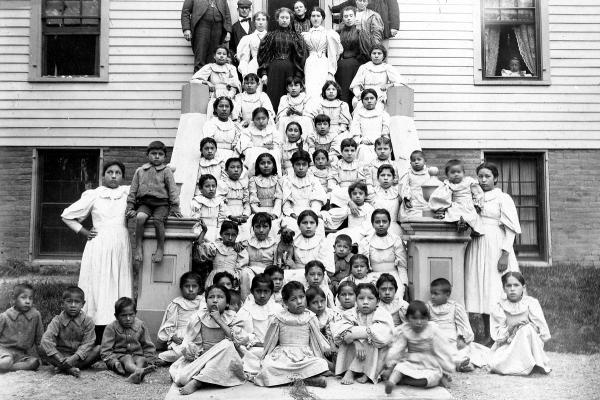WHEN POPE FRANCIS visited Canada in July 2022, he said he was “deeply sorry” for the abuses inflicted upon peoples from First Nations by more than a century of Catholic-run residential schools. Francis decried the ways “many Christians supported the colonizing mentality of the powers that oppressed the Indigenous peoples,” which resulted in “cultural destruction and forced assimilation.”
To his credit, the pontiff acknowledged that his apology was not “the end of the matter,” and that serious investigation of what was perpetrated and enabled by the church was necessary for the survivors of the schools “to experience healing from the traumas they suffered.”
In the United States, the Seneca Nation is paving a path toward that healing process in their homelands, in particular from harm caused by a Presbyterian-run residential school.
A month after the pope’s apology, Matthew Pagels, then-president of the Seneca Nation — which historically inhabited territory throughout the Finger Lakes and Genesee Valley regions of New York — announced a new initiative to compile and catalog a list of residential school attendees.
To lead the effort, Pagels tapped Sharon Francis, a member of the Wolf Clan of the Seneca Nation and program coordinator at the Seneca Nation crime victims unit. Her passion, she said, is helping her communities heal from personal, intergenerational, and historical traumas.
Identifying those who attended residential schools, Francis said, is “more than just names.” The initiative is about giving attendees “a chance to share their story,” she told Sojourners. It’s an attempt to “preserve some of our history and how that’s impacted us in the present and generations to come.”
The process involves creating comfortable spaces for residential school survivors — and, often, their family members — to share their experiences. Most who endured the schools from that time are now deceased and unable to do so themselves without the voices of their living relatives speaking in their stead. “We know that when working with families and folks, sometimes they’re not always ready to share their life with us,” Francis said, “but we want to give them the opportunity to be able to heal with us, too.”
The list is currently being compiled under the Nation’s crime victims unit. For Francis, this highlights the unspeakable acts, some of which were “criminal in nature,” against Seneca and Haudenosaunee peoples. She explained, “We’re trying to bring awareness, whether they were abused, neglected, sexually assaulted, or physically disciplined. We’re hoping to show that healing can still occur for our own selves and our community, and that the communities around us understand what happened.”
The church’s troubling history
PRIOR TO HER involvement in a Presbyterian healing tour in 2009, Presbyterian minister Mary Lee Talbot was unfamiliar with her denomination’s role in the harm caused by the residential schools. In 1855, two white Presbyterian missionaries, Rev. Asher Wright and his wife, Laura, opened the Thomas Asylum for Orphan and Destitute Indian Children, which later became the Thomas Indian School, on what is now the Seneca Nation’s Cattaraugus Territory. A Presbyterian congregation called the United Mission, where the Wrights preached, was founded nearby two years later.
Talbot told Sojourners that she knew the Wrights were a fundamental part of Seneca history, and that “the people in the church are very proud of that.” Talbot, who is not Indigenous, admitted that the school did not impact “the people that I know best” on a day-to-day basis, and she recognizes that the school is still “a focal point of injustice” and contention throughout the Nation.
feature.pietroraziospot1.jpg

These days, Talbot drives 40 miles from Jamestown, N.Y., twice a month to reach the reservation, a commitment she has maintained for more than a decade. She keeps coming back to host Bible study sessions in part because she feels welcomed by the congregation, and she says the feeling is mutual. She utters the Lord’s Prayer in the Seneca language, singing hymns and the doxology whenever she offers informal services at the former United Mission, which was renamed Wright Memorial Presbyterian Church during the congregation’s centennial celebration two years after the boarding school was shut down in 1957. Not surprisingly, that commemoration is still painful to many.
Talbot’s acts have helped keep the sparsely attended Presbyterian congregation alive. “Even though we don’t have more than seven or eight in worship, there’s still that reach within the community,” said Talbot, who works on behalf of the Presbytery of Western New York, the regional governing body for 47 churches. “They talk about other churches they go into, and nobody ever speaks to them. We introduce everybody; it just feels comfortable.” That “comfort,” of course, is complicated by the traumatic and troubling history experienced by the Native community.
‘Her life started in an institution and ended in one’
SENECA NATION MEMBER Marlene Bennett Johnson had been placed in a 37-bed nursing home, Absolut Care of Allegany, when she started dealing with dementia in February 2020, just before the COVID-19 pandemic began. Her daughter, Lori Quigley, said that when she finally got permission to visit her mother through a glass door, she started hearing unsettling stories.
“‘You’re not going to believe it, Lori,’” her mother told her. “‘Those guys in the white coats, they took me outside last night and threw me against the brick wall.’ I’m realizing she’s not telling me stories that are happening to her there and then in the nursing home.”
When Johnson was a young girl, she was designated as an orphan and sent to the Thomas Indian School. Quigley said that her mother struggled with traumatic childhood memories from 80 years before, “but, because of the dementia, she couldn’t distinguish whether it was a dream.”
After that frightening encounter, Quigley sought to learn more about her mother’s upbringing as a residential school survivor. “The saddest thing is that her life started in an institution and ended in one,” Quigley said, “but I can’t imagine that her story, in that instance, is isolated. I would imagine for many of them at that age, it came back to haunt them.”
Johnson passed away in the nursing home in August 2022.
Quigley, who served as interim president of Medaille University in Buffalo until August and grew up in the Seneca’s Allegany Territory, still believes “the Wrights [founders of the Thomas Indian School] had good intentions for the most part” but were blinded by trying to “assimilate and take land,” leaving an indelible wound behind. “We talk about how we lost land, how we lost language, how we lost some of our culture, our customs, our traditions, but we never speak about the impact that the residential boarding school had on destroying families,” Quigley said. “It wasn’t [meant] to save little Indian children. They took children away from my family and never gave them back. That’s really hard for me to say.”
In fact, Quigley said, as the daughter of a residential school survivor, she recognized that that cyclical, intergenerational struggle routinely appeared while parenting her own son. “My mother raised us just like we lived in an institution, because she didn’t know any better. We knew she loved us, but she ran everything military style — the way we kept our house, no hugs, no kisses,” Quigley said. “I probably could have been a lot more nurturing with my own son — I can see that now — when we were young mothers, and now I can see it when we’re grandmothers.”
Quigley remembers getting dressed to attend the funerals of friends her mother grew up with, people who survived the Thomas Indian School. She explained that the real tragedy was how many of them became alcoholics and ultimately died young, unable to move past their pain and reach their full potential. She added, “They couldn’t survive what happened to them” — the early separation from family, culture, and emotional nurture, as well as other possible abuse.
“The more understanding you have of our history and what happened to us, the better able you are to make judgments for or against us,” Quigley said. “I think that the Nation as a whole is definitely moving in the direction of finding assistance for [our] families.”
Stolen generations
REV. IRVIN PORTER an enrolled member of the Gila River Indian Community, started out as a commissioned lay leader at the 49-member Church of the Indian Fellowship in Tacoma, Wash., where he’s now the congregation’s first Native pastor. Porter’s father, Lawrence, was an ordained minister for the Nez Perce Presbyterian churches in Spalding, Idaho, and worked for the Intermountain and Phoenix Indian schools.
Porter said his ancestors have been churchgoers at the First Indian Presbyterian Church in Kamiah, Idaho, since its founding in 1871 — the congregation where he became an ordained minister. For a decade, Porter has served as an associate for the Native American Intercultural Congregational Support under the Presbyterian Church (U.S.A.), a role in which he serves as liaison between the 95 Native congregations in the denomination. When difficult conversations around the Doctrine of Discovery or boarding schools are brought up, Porter is often called to offer his insight, even for non-Native parishes, while acting as the liaison between Native congregations and the national church through a position created by the Native American Consulting Committee in the late 1970s.
feature.pietrorazio.spot2.jpg

The Thomas Indian School, situated within the boundaries of the Seneca Nation, is one of at least 21 known boarding schools affiliated with the PC(USA), according to the National Native American Boarding School Healing Coalition. A formal apology issued by the denomination in 2017 was addressed to former students at residential boarding schools, their families, and communities that were “part of ‘stolen generations’ during the Indian-assimilation movement.”
There are relatively few Native-only congregations left nationwide. Jimersontown Presbyterian Church on the Seneca Allegany Territory, Wright Memorial Presbyterian Church, and Shinnecock Presbyterian Church on Long Island are the only remaining Presbyterian Native congregations east of the Mississippi River. Most Native congregations are off the beaten track and rarely get visits from national staff, leading to staffing issues. “The congregations cannot afford to pay full-time because they need some type of assistance from the presbytery,” according to Porter.
On top of those structural obstacles, Indigenous communities have been betrayed by Christian religious institutions that actively sought to erase their identity, language, and culture through coercive measures of indoctrination. In the case of Wright Memorial Church, Talbot said her parishioners haven’t been interested in conversations about the traumatic history since she “can’t force the congregation to do that until they feel some need.”
“There’s trauma, internalized oppression, that the survivors of those boarding schools kept within their lives,” said Porter, who helped author his denomination’s national apology. “Edicts against speaking your own language, practicing any kind of culture — that was all forbidden; everything was ‘Christian.’”
“That generation is almost gone completely,” he added. “Now, we’re getting into a time where those of us that remain never went into a school like that.”
Today, the Senecas and their neighboring Haudenosaunee communities in the U.S. and Canada continue grappling with the legacy of how residential schools, for generations, shaped the lives of their loved ones — while the religious institutions that founded the schools wrestle with their own role in a troubling and traumatizing history.

Got something to say about what you're reading? We value your feedback!

